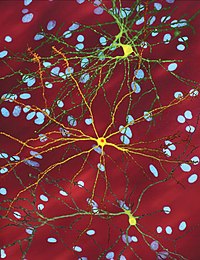
Photo from wikipedia
Methyl-CpG-binding-protein 2 (MeCP2) is a nuclear protein expressed in all cell types, especially neurons1. Mutations in the MECP2 gene cause Rett syndrome (RTT), an incurable neurological disorder that disproportionately affects… Click to show full abstract
Methyl-CpG-binding-protein 2 (MeCP2) is a nuclear protein expressed in all cell types, especially neurons1. Mutations in the MECP2 gene cause Rett syndrome (RTT), an incurable neurological disorder that disproportionately affects young girls2. Strategies to restore MeCP2 expression phenotypically reverse RTT-like symptoms in male and female MeCP2-deficient mice3–5, suggesting that direct nuclear delivery of functional MeCP2 could restore MeCP2 activity. We report that ZF-tMeCP2, a conjugate of MeCP2(Δaa13-71, 313-484)6 and the cell-permeant mini-protein ZF5.37–11, both binds DNA in a methylation-dependent manner and reaches the nucleus of model cell lines intact at concentrations above 700 nM. When delivered to live cells, ZF-tMeCP2 engages the NCoR/SMRT co-repressor complex and selectively represses transcription from methylated promoters. Efficient nuclear delivery of ZF-tMeCP2 relies on a unique endosomal escape portal provided by HOPS-dependent endosomal fusion. The Tat conjugate of MeCP2 (Tat-tMeCP2), evaluated for comparison, is degraded within the nucleus, is not selective for methylated promoters, and trafficks in a HOPS-independent manner. These results support the feasibility of a HOPS-dependent portal for delivering functional macromolecules to the cell interior using the cell-penetrant mini-protein ZF5.3. Such a strategy could broaden the impact of multiple families of protein-derived therapeutics.
Journal Title: ACS Central Science
Year Published: 2022
Link to full text (if available)
Share on Social Media: Sign Up to like & get
recommendations!